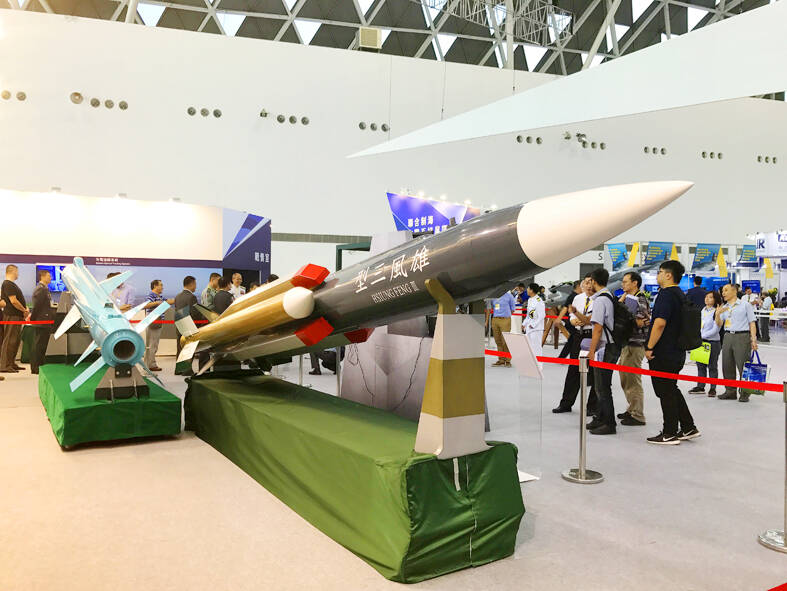The military is to station mobile missile defense systems along Taiwan’s east coast after Chinese military vessels were spotted in the area, a source said yesterday.
On Friday, six Chinese warships, including the aircraft carrier Liaoning, entered the Pacific Ocean via the Miyako Strait, posing a threat to Taiwan’s east coast.
The Japanese Ministry of Defense on Friday confirmed the passage of the ships, saying that its Maritime Self-Defense Force monitored the vessels, adding that they did not enter Japan’s territorial waters.

Photo: Hung Chen-hung, Taipei Times
The source said the vessels were likely headed to the Pacific Ocean for training exercises.
The vessels were identified as the Liaoning with hull number 16, Type 054A guided-missile frigate Zaozhuang with hull number 542, Type 052D guided-missile destroyer Chengdu with hull number 120, Type 055 guided-missile destroyer Anshan with hull number 103, Type 055 guided-missile destroyer Wuxi with hull number 104 and Type 901 supply ship Hulunhu with hull number 901.
The scale and formation of the battle group was rare, the source said, adding that it was likely preparing for aircraft takeoff and landing exercises, and related combat training.
Following the passage, the Ministry of National Defense in Taipei ordered the navy and air force to improve readiness measures on Taiwan’s east coast.
The ministry said that while this was not the first passage by Chinese naval vessels through the Miyako Strait — and although it always monitors such passages and is ready to respond — it was enhancing missile defenses on the east coast as an improved readiness measure.
The military has deployed mobile missile launchers for Hsiung Feng II and Hsiung Feng III anti-ship missiles to eastern Taiwan, the source said, adding that it would also deploy shore-mounted Harpoon missiles procured from the US.
The deployments would be funded by a special budget, and members of the marine corps would take charge of the missile systems, the source said.
Missile systems would be upgraded nationwide, but priority has been given to the east coast, due to a greater risk there, they added.
The Chungshan Institute of Science and Technology would design and supervise missile-system installations, but the exact locations of deployment would not be made public due to security reasons, the source said.
The two Hsiung Feng systems would each have a range of 150km and would later be complemented with Harpoon deployments, which have a range of 250km, the source said.
Fixed military facilities, like those on Hualien County’s Hetianshan (賀田山), would be targets in wartime, which is why it is deploying mobile systems, they added.
The missile upgrade program is expected to be completed in 2026, and training would be conducted on the east coast, where missile-storage and living facilities, as well as a control room, are already in place, they said.

Seventy percent of middle and elementary schools now conduct English classes entirely in English, the Ministry of Education said, as it encourages schools nationwide to adopt this practice Minister of Education (MOE) Cheng Ying-yao (鄭英耀) is scheduled to present a report on the government’s bilingual education policy to the Legislative Yuan’s Education and Culture Committee today. The report would outline strategies aimed at expanding access to education, reducing regional disparities and improving talent cultivation. Implementation of bilingual education policies has varied across local governments, occasionally drawing public criticism. For example, some schools have required teachers of non-English subjects to pass English proficiency

‘FORM OF PROTEST’: The German Institute Taipei said it was ‘shocked’ to see Nazi symbolism used in connection with political aims as it condemned the incident Sung Chien-liang (宋建樑), who led efforts to recall Democratic Progressive Party (DPP) Legislator Lee Kun-cheng (李坤城), was released on bail of NT$80,000 yesterday amid an outcry over a Nazi armband he wore to questioning the night before. Sung arrived at the New Taipei City District Prosecutors’ Office for questioning in a recall petition forgery case on Tuesday night wearing a red armband bearing a swastika, carrying a copy of Adolf Hitler’s Mein Kampf and giving a Nazi salute. Sung left the building at 1:15am without the armband and apparently covering the book with a coat. This is a serious international scandal and Chinese

TRADE: The premier pledged safeguards on ‘Made in Taiwan’ labeling, anti-dumping measures and stricter export controls to strengthen its position in trade talks Products labeled “made in Taiwan” must be genuinely made in Taiwan, Premier Cho Jung-tai (卓榮泰) said yesterday, vowing to enforce strict safeguards against “origin laundering” and initiate anti-dumping investigations to prevent China dumping its products in Taiwan. Cho made the remarks in a discussion session with representatives from industries in Kaohsiung. In response to the US government’s recent announcement of “reciprocal” tariffs on its trading partners, President William Lai (賴清德) and Cho last week began a series of consultations with industry leaders nationwide to gather feedback and address concerns. Taiwanese and US officials held a videoconference on Friday evening to discuss the

PERSONAL DATA: The implicated KMT members allegedly compiled their petitions by copying names from party lists without the consent of the people concerned Judicial authorities searched six locations yesterday and questioned six people, including one elderly Chinese Nationalist Party (KMT) member and five KMT Youth League associates, about alleged signature forgery and fraud relating to their recall efforts against two Democratic Progressive Party (DPP) legislators. After launching a probe into alleged signature forgery and related fraud in the KMT’s recall effort, prosecutors received a number of complaints, including about one petition that had 1,748 signatures of voters whose family members said they had already passed away, and also voters who said they did not approve the use of their name, Taipei Deputy Chief Prosecutor